What is Ahrefs? Top 8 Essential Ahrefs Tools for SEO in 2025
- Published on

- What is Ahrefs?
- Why is Ahrefs indispensable for SEOers?
- 1. Massive database:
- 2. Superior to other tools:
- 3. Comprehensive SEO strategy support:
- How does Ahrefs work?
- Powerful data collection bots
- Data analysis steps in Ahrefs
- Transparency and user-friendly interface
- Top 8+ standout features of Ahrefs
- Audit Backlink
- Leveraging Competitors' Backlinks
- Keyword Research
- Competitor Analysis
- Track Competitors' Keywords
- Organic Visibility
- Brand Management
- Site Audit
- Key Metrics in Ahrefs
- Ahrefs Rank (AR)
- URL Rating (UR)
- Domain Rating (DR)
- Referring Domains
- Organic Keywords & Organic Traffic
- Keyword Difficulty (KD)
- Traffic Value
- How to Use Ahrefs Metrics Effectively
- How to Use Ahrefs Effectively
- How to Optimize Content with Ahrefs
- Link-Building Strategies
- Evaluate SEO Performance
- Competitor Research and Tracking
- Ahrefs Pricing: Choosing the Right Plan for Your Needs
- Ahrefs Pricing Plans
- Which Plan Should You Choose?
- Things to Consider When Choosing a Plan
- Conclusion
- Key Benefits of Ahrefs:
In the field of Digital Marketing, understanding and analyzing website data is the key to achieving higher rankings on search engines. This is why Ahrefs—one of the most powerful SEO tools in the world—has become the top choice for SEO experts and marketers.
With its capabilities in backlink analysis, keyword research, and website performance evaluation, Ahrefs not only supports SEO optimization but also helps you develop content strategies and improve sustainable traffic growth. Notably, Ahrefs has the second-largest database globally, following Google, with data updates every 15–30 minutes, providing valuable and accurate insights to enhance your SEO strategy effectively.
In this article, we will dive into the details of what Ahrefs is, how it works, its standout features like Backlink Audits and Keyword Research, and why Ahrefs is an indispensable "power tool" for successful Digital Marketing campaigns.
What is Ahrefs?
Ahrefs is one of the leading SEO tools available today, designed to analyze and comprehensively optimize websites. From keyword research and backlink analysis to competitor tracking, Ahrefs offers users a massive and precise data repository to implement effective SEO strategies. Thanks to its exceptional data collection capabilities, Ahrefs has become a trusted tool for millions of SEO professionals worldwide.
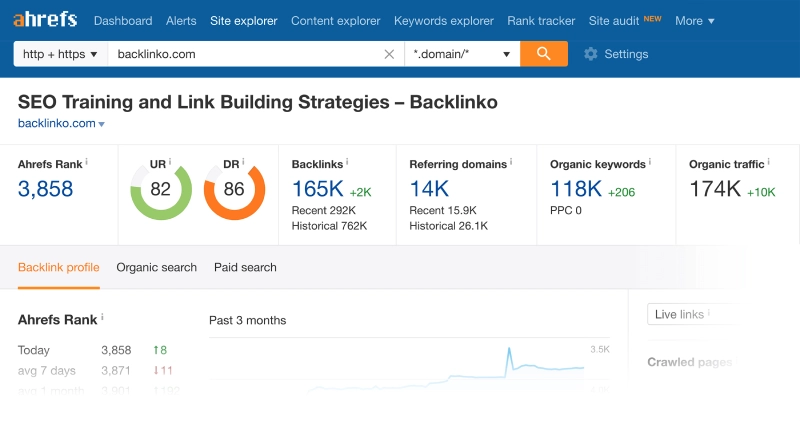
Let’s explore why Ahrefs has become such an essential tool for SEO in the next section.
Why is Ahrefs indispensable for SEOers?
Ahrefs is not just a support tool; it is an integral part of SEO strategies for professionals. Its comprehensive features, deep analysis, and real-time data updates make Ahrefs a reliable "partner" for improving website optimization. Here’s why Ahrefs is so important:
1. Massive database:
- Processes over 16.3 trillion backlinks from global websites.
- Manages and analyzes 10.1 billion keywords across 171 countries.
- Monitors over 200 million domains with continuous updates every 15–30 minutes.
- Updates 494 million keywords monthly from major search engines like Google, YouTube, and Amazon.
2. Superior to other tools:
- Ranked second globally for data collection capability, only behind Google.
- Compared to tools like Bing, SEMrush, and Moz, Ahrefs excels in speed and precision for website data analysis.
3. Comprehensive SEO strategy support:
- Optimizes keywords and organic traffic.
- Offers detailed competitor research, helping you identify market opportunities.
- Provides suggestions for improving backlinks to boost Domain Rating (DR) and URL Rating (UR).
With its exceptional features and extensive data, Ahrefs is a top choice for helping SEO professionals achieve optimal results. The next section will help you understand how this tool operates.
How does Ahrefs work?
Powerful data collection bots
Ahrefs operates using a system of data collection bots, similar to Google’s crawlers. These "spiders" crawl through billions of websites daily, recording how pages are interconnected and gathering data on keywords, backlinks, content, and other SEO metrics.
-
Operational scale:
- Collects data from 16.3 trillion backlinks.
- Indexes 10 billion pages daily.
- Updates data every 15–30 minutes, ensuring accuracy and real-time insights.
-
Superior speed: The crawling speed of Ahrefs’ bots reaches 14 billion pages per day, significantly faster than other SEO tools like SEMrush or Moz. This enables Ahrefs to provide the freshest data, supporting quick and accurate optimizations.
Data analysis steps in Ahrefs
Ahrefs doesn’t just collect data—it processes and analyzes it through the following steps:
-
Website data collection:
- Ahrefs’ bots visit websites, analyzing their link structures and content.
- Data on keywords, backlinks, and traffic is stored and synchronized.
-
Link analysis:
- Identifies the number and quality of backlinks pointing to a website.
- Measures Domain Rating (DR) and URL Rating (UR).
-
Keyword and content research:
- Suggests potential keywords based on difficulty (Keyword Difficulty) and search volume.
- Provides a content gap list to identify areas needing improvement or new content creation.
Transparency and user-friendly interface
Ahrefs offers a user-friendly interface with clear and detailed reports. Users can easily access information like:
- Backlink Profile: Detailed reports on backlinks pointing to a website.
- Keyword Explorer: Discover new keywords and analyze their difficulty.
- Content Explorer: Find content ideas based on current trends.
Thanks to its effective and systematic operations, Ahrefs empowers users with comprehensive control over their SEO strategies. In the next section, we will explore the most standout features of this tool.
Top 8+ standout features of Ahrefs
Ahrefs is not just a regular SEO tool but a “comprehensive arsenal” equipped with powerful features to effectively optimize websites. Below are 8+ standout features that make Ahrefs the top choice for SEO professionals.
Audit Backlink
The Audit Backlink feature allows you to thoroughly examine and analyze backlinks pointing to your website. This helps you evaluate the quality of backlinks, detect and eliminate toxic links that could harm your rankings.
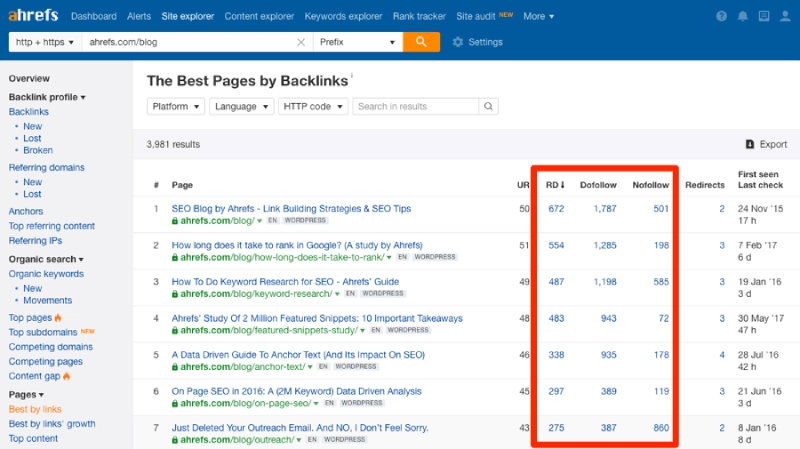
-
Benefits:
- Detailed analysis of your link profile.
- Identification of unnatural or spammy links.
- Suggestions for link optimization, reducing the risk of Google penalties.
-
Practical Application: For instance, if your website experiences a sudden drop in rankings, you can use Audit Backlink to check for harmful backlinks and address them promptly.
Leveraging Competitors' Backlinks
One of Ahrefs' most powerful features is the ability to leverage competitors' backlinks. This tool lets you view a list of backlinks pointing to competitors' websites and identify opportunities to build similar links.
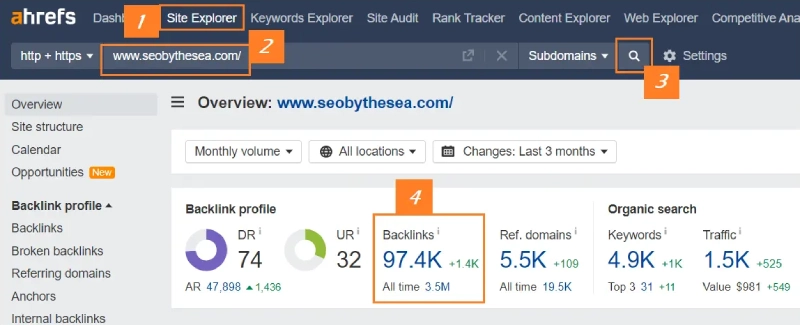
-
Steps to Implement:
- Go to Site Explorer and enter your competitor's URL.
- Navigate to Backlink Profile → Backlinks.
- Filter high-quality links and reach out to the website owners to build similar backlinks.
-
Benefits:
- Quickly identify opportunities from high-quality backlinks.
- Strengthen your website by replicating effective link-building strategies from competitors.
Keyword Research
Ahrefs offers the Keyword Explorer tool, allowing you to discover millions of potential keywords from various sources, including Google, YouTube, Amazon, and more.
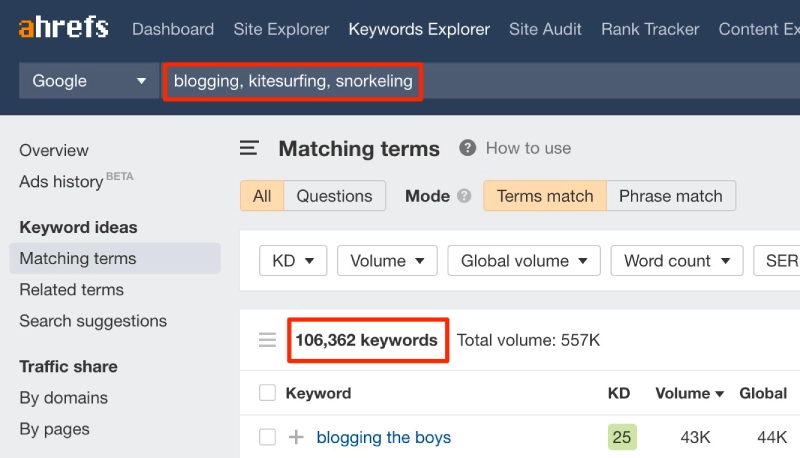
Below are the detailed steps to use Ahrefs Keyword Explorer for keyword analysis and competitive evaluation:
Step 1: Access Keyword Explorer
- Open the Keyword Explorer tool in Ahrefs.
Step 2: Enter Potential Keywords
- Input the keyword you want to analyze into the search bar. The tool will automatically return a list of metrics related to the keyword.
Step 3: Analyze Key Metrics
- Review the following key metrics to evaluate the keyword:
- Keyword Difficulty (KD): The difficulty of ranking in Google’s top 10 for the keyword.
- Search Volume: The average monthly search volume.
- Paid vs Organic: The ratio of paid to organic traffic for the keyword.
Step 4: Export SERP Data
- Scroll to the SERP Overview section, which displays a list of top-ranking URLs for the keyword.
- Click Export to download the list as an Excel file.
Step 5: Filter Essential Data
- In the downloaded Excel file, retain the following important columns:
- URL: The URL of the ranking page.
- Backlinks: The number of backlinks pointing to the page.
- Referring Domains: The number of unique domains linking to the page.
- URL Rating (UR) and Domain Rating (DR): Metrics measuring the link strength of the URL and domain.
- Facebook: The number of social media shares (if applicable).
Step 6: Calculate Average Metrics
- Use the average formula to compile data from each column, providing a comprehensive overview of the strengths of the top-ranking URLs.
Step 7: Evaluate and Compare
- Add your website’s domain or target landing page to the list and input the corresponding metrics.
- Compare your strengths with competitors to assess your ability to compete for the keyword.
Competitor Analysis
Ahrefs enables detailed competitor strategy analysis through metrics like:
- Backlink Profile: View the competitor’s list of backlinks.
- Organic Keywords: Discover the keywords your competitor ranks for.
- Content Gap: Identify content gaps between your website and competitors.
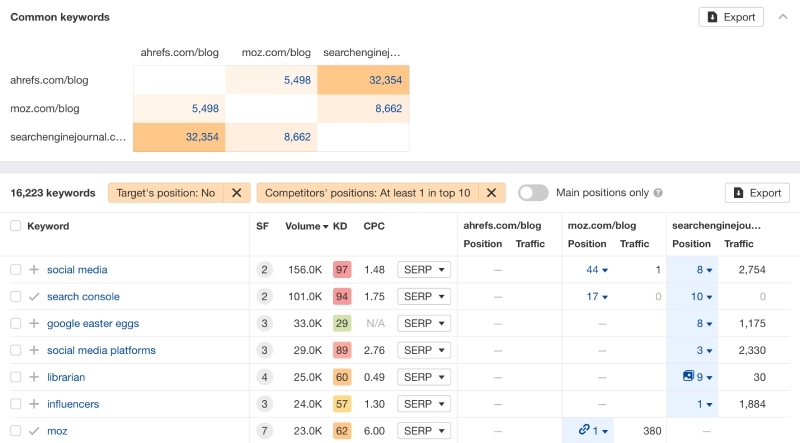
- Benefits:
- Develop more competitive content and backlink strategies.
- Identify growth opportunities that competitors have not yet exploited.
Track Competitors' Keywords
Using the Site Explorer feature, you can track the keywords competitors use to create content and rank. This allows you to develop new content or improve existing content to dominate the rankings.
- Applications:
- Create content based on competitors’ keywords.
- Increase traffic by targeting low-competition but high-potential keywords.
Organic Visibility
Ahrefs provides a comprehensive view of Organic Visibility—your website’s natural search traffic. This tool helps you evaluate the effectiveness of your SEO strategy and monitor ranking changes over time.

- Benefits:
- Track traffic growth trends over time.
- Measure the performance of optimized keywords and content.
Brand Management
Ahrefs' Alerts feature notifies you whenever your brand or related keywords are mentioned anywhere on the internet.
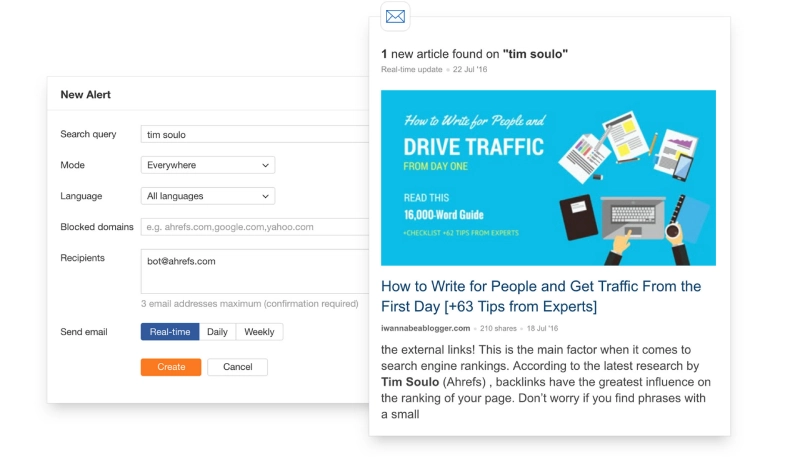
- Benefits:
- Monitor brand reputation.
- Identify backlink opportunities from brand mentions.
Site Audit
Site Audit is a technical website analysis feature that helps detect errors and provides recommendations to improve user experience and Google-friendliness.
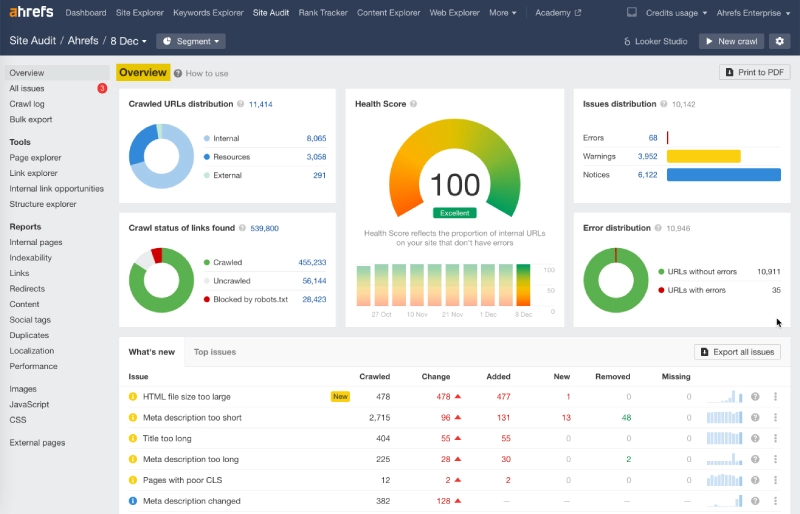
- Key Features:
- Identify issues like page speed, duplicate content, and structural problems.
- Offer actionable recommendations to optimize SEO performance.
With these features, Ahrefs is truly a comprehensive tool that empowers you to build and execute effective SEO strategies. Continue exploring Key Metrics in Ahrefs in the next section to maximize the tool's potential.
Key Metrics in Ahrefs
Understanding the key metrics in Ahrefs is essential for optimizing your SEO strategy effectively. Here are the crucial metrics to know:
Ahrefs Rank (AR)
- Definition: Ahrefs Rank (AR) measures a website's ranking based on the quantity and quality of backlinks pointing to it. The lower the AR, the stronger the website.
- Application: Use this metric to gauge your website's position compared to competitors.
For example, Facebook currently holds the #1 spot in Ahrefs Rank, demonstrating the strongest backlink profile in the world.
URL Rating (UR)
- Definition: UR measures the strength of backlinks pointing to a specific URL. The value ranges from 1–100, with higher scores indicating stronger links.
- Application: Analyze the strength of specific pages and focus on improving those with low UR but high potential.
Domain Rating (DR)
- Definition: DR measures the overall strength of a domain based on the quality and quantity of backlinks pointing to the entire website.
- Application: DR helps evaluate the authority of a website when choosing sources for link building.
Referring Domains
- Definition: Referring Domains represent the number of unique domains linking to your website.
- Important Note:
- Multiple backlinks from the same domain are less valuable than backlinks from different domains.
- A healthy ratio of backlinks to referring domains is 1:1 to avoid being flagged as spam by Google.
Organic Keywords & Organic Traffic
- Organic Keywords: These are the keywords that help a website attract organic traffic from search engines.
- Organic Traffic: The actual traffic a website receives from organic keywords.
- Application: These metrics allow you to evaluate the effectiveness of your current SEO strategy and identify areas for further optimization.
Keyword Difficulty (KD)
- Definition: KD measures the difficulty of ranking a keyword in Google’s top 10, with a score ranging from 1–100. The higher the score, the more competitive the keyword.
- Application: Use KD to select keywords that align with your website's current strength. For new websites, prioritize keywords with low KD.
Traffic Value
- Definition: This is the estimated monetary value of your website’s organic traffic if you were to pay for ads targeting those keywords.
- Application: Traffic Value helps you visualize the financial impact of organic keywords, enabling you to build cost-effective SEO strategies.
How to Use Ahrefs Metrics Effectively
- Track UR and DR to measure the effectiveness of your link-building strategy.
- Use Keyword Difficulty to select keywords that match your competitive ability.
- Increase the number of Referring Domains by building links from authoritative websites.
Understanding and effectively utilizing these metrics will help you make informed decisions, improve rankings, and sustainably grow your website’s traffic. Next, let’s dive into strategies to maximize Ahrefs’ potential!
How to Use Ahrefs Effectively
To fully leverage Ahrefs’ power, you need to apply its features to specific SEO strategies. Below are detailed steps to help you optimize content, build links, and evaluate SEO performance effectively.
How to Optimize Content with Ahrefs
Ahrefs provides tools to optimize content by analyzing keywords and identifying content gaps (Content Gap).
Steps to Follow:
- Go to Site Explorer and enter your competitor’s URL.
- Select Content Gap to view keywords your competitor ranks for, but your website does not.
- Identify suitable keywords and create high-quality content to fill these gaps.
Benefits:
- Quickly identify potential content to attract new traffic.
- Increase competitiveness against market leaders.
Link-Building Strategies
Link building is crucial for improving Domain Rating (DR) and enhancing rankings on Google. With Ahrefs, you can find link-building opportunities from competitors or through Broken Links.
Steps to Follow:
- Go to Site Explorer and enter your competitor’s URL.
- Access Backlink Profile to find high-quality links your competitor has.
- Filter Broken Links or low-quality links and propose replacements with your content.
- Reach out to the webmasters to establish relationships and secure backlinks.
Benefits:
- Increase the number of Referring Domains.
- Enhance your website's trustworthiness and authority in search engines.
Evaluate SEO Performance
Ahrefs enables you to track your website's SEO performance through tools like Site Audit and Organic Traffic Analysis.
Steps to Follow:
- Access Site Audit to check your website's overall performance.
- Identify technical issues like page speed, duplicate content, and broken links.
- Monitor Organic Traffic to evaluate growth from organic keywords.
- Use Organic Keywords data to improve underperforming content.
Benefits:
- Detect and fix issues promptly to enhance user experience and Google-friendliness.
- Measure the effectiveness of each SEO campaign and refine your strategy.
Competitor Research and Tracking
Ahrefs is an ideal tool for analyzing competitors, helping you seize opportunities and optimize your SEO strategies.
Steps to Follow:
- Go to Site Explorer and enter your competitor’s domain.
- Navigate to Top Pages to see the pages generating the most traffic.
- Use data from Backlinks and Organic Keywords to develop similar or better content strategies.
Benefits:
- Understand competitors' strategies to outperform them in rankings.
- Identify opportunities from untapped keywords and links competitors are using.
Ahrefs Pricing: Choosing the Right Plan for Your Needs
Ahrefs offers flexible pricing plans suitable for individuals, freelancers, and large enterprises. Depending on your SEO goals and website scale, you can choose the plan that best fits your needs, optimizing costs while leveraging the tool’s full capabilities.
Ahrefs Pricing Plans
Here is a breakdown of Ahrefs’ monthly pricing plans:
| Plan | Cost (USD) | Suitable For | Key Features |
|---|---|---|---|
| Lite | $99/month | Freelancers, small business owners | Basic backlink analysis, keyword research, up to 500 tracked rows per month. |
| Standard | $199/month | Small SEO teams, medium-sized agencies | Additional keyword data, in-depth SERP analysis, up to 1,500 tracked rows per month. |
| Advanced | $399/month | Large companies, professional agencies | Multi-project tracking, API access, up to 5,000 tracked rows per month. |
| Enterprise | $999/month | Corporations, agencies managing multiple large projects | Unlimited data, advanced customizations, priority support. |
Which Plan Should You Choose?
- Freelancers and small businesses: The Lite plan is ideal for saving costs while meeting basic needs such as keyword research, backlink analysis, and website audits.
- Small SEO teams or medium-sized agencies: The Standard plan is a great choice, offering larger keyword data and deeper SERP analysis capabilities.
- Large enterprises and professional agencies: The Advanced or Enterprise plans are best suited for managing multiple projects and providing unlimited data.
Things to Consider When Choosing a Plan
- Try the Trial Plan: Ahrefs offers a trial plan for just $7 for 7 days, allowing you to explore its features before committing to an upgrade.
- Assess Your Real Needs: Depending on your website’s scale, the number of keywords, and your SEO strategy, choose a plan that prevents resource wastage.
- Long-term Benefits: While Ahrefs isn’t cheap, it’s a worthy investment for SEO, with the potential to grow traffic and rankings sustainably.
Conclusion
Ahrefs is not just a powerful SEO tool; it is also a comprehensive platform for building an effective website optimization strategy. From backlink analysis and keyword research to competitor evaluation, Ahrefs provides all the essential features needed to improve website rankings and drive natural traffic growth.
Key Benefits of Ahrefs:
- Comprehensive Analysis: Supports effective keyword research, backlink tracking, and content optimization.
- Strong Competitive Edge: Data is continuously updated, second only to Google.
- Versatile Support: Features cater to a wide range of users, from freelancers to large enterprises.
If you’re looking for a holistic SEO tool, Ahrefs is a must-have. Start with the trial plan for just $7 for 7 days to experience its exceptional features and unlock the full potential of your SEO strategies.
Latest Posts

Lesson 26. How to Use break, continue, and return in Java | Learn Java Basics
A guide on how to use break, continue, and return statements in Java to control loops and program execution flow effectively.

Lesson 25. The do-while Loop in Java | Learn Basic Java
A detailed guide on the do-while loop in Java, including syntax, usage, examples, and comparison with the while loop.

Lesson 24. How to Convert Decimal to Binary in Java | Learn Basic Java
A guide on how to convert numbers from the decimal system to the binary system in Java using different methods, with illustrative examples.

Lesson 23. How to Use the While Loop in Java | Learn Java Basics
Learn how to use the while loop in Java with syntax, real-world examples, and practical applications in Java programming.
Related Posts

What is Domain Authority? 13-Step Guide to Improve DA Score for Your Website in 2025
Discover what Domain Authority is and its importance in SEO. A detailed guide on the 13-step process to effectively increase DA, from content research and technical optimization to building quality backlinks for a sustainable SEO strategy.
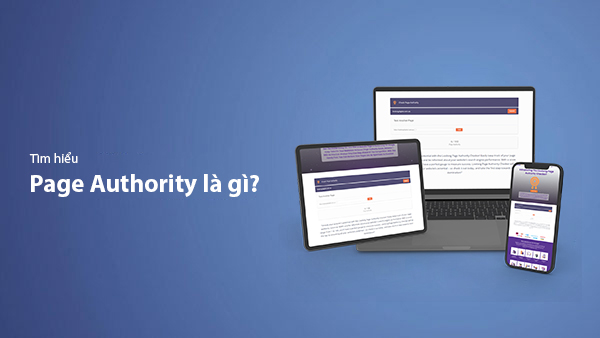
What is Page Authority? The Importance of Page Authority for SEO in 2025
Learn what Page Authority (PA) is and its role in SEO optimization to help improve your website's ranking on search engines in 2025.

What is Google Index? A Guide to 13 Ways to Speed Up Website Indexing in 2025
Discover what Google Index is and learn detailed guidelines on 13 effective ways to get your website indexed quickly and boost your SEO rankings on Google in 2025.
![What is Onpage SEO? 23+ Basic & Advanced Onpage Optimization Checklist [2025]](/blog-posts/seo-onpage/seo-onpage-thumb.jpg)
What is Onpage SEO? 23+ Basic & Advanced Onpage Optimization Checklist [2025]
Learn the concept of Onpage SEO and the 23+ basic to advanced Onpage optimization checklist to improve website quality and boost search rankings effectively.

